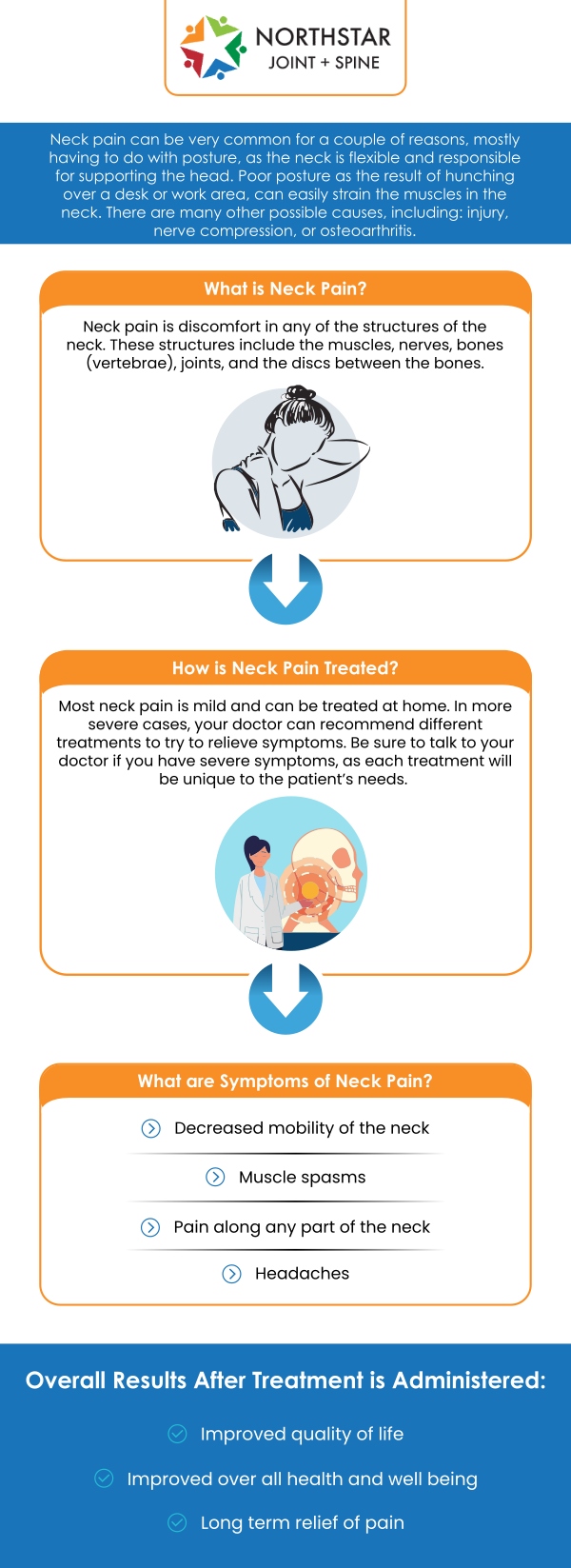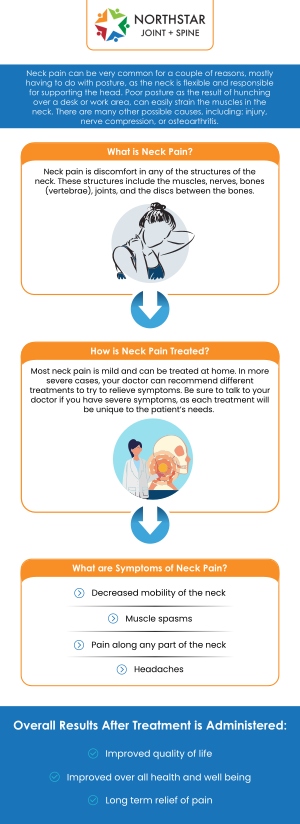Neck Pain After Sleeping
Neck pain after sleeping is often caused by poor posture or an uncomfortable pillow. It can range from mild stiffness to severe discomfort. Addressing the root cause is key to preventing further pain. If the pain persists, Board Certified Dr. Robert Nocerini, MD, and the team at Northstar Joint and Spine can help determine the appropriate treatment for relief and long-term comfort. For more information, please contact us today or schedule an appointment online. We are conveniently located at 7704 San Jacinto Pl Suite #200 Plano, TX 75024.


Table of Contents:
Why does neck pain occur after sleeping?
Can sleeping position cause neck pain?
How long does it take for neck pain from sleeping to go away?
How can I prevent neck pain after sleeping?
How Dr. Robert J. Nocerini, MD, at Northstar Joint and Spine Can Help Relieve Your Neck Pain After Sleeping
Neck pain after sleeping is a common sensation and can stem from various potential causes. It commonly arises from muscle strain or poor spinal alignment, which may result from an improper sleeping position or inadequate support. If an individual sleeps in a position where the head and neck are not aligned with the rest of the spine, stress is placed on muscles, tendons, and ligaments.
This can lead to discomfort upon waking. Additionally, factors such as using a pillow that is too large or too flat, sleeping on an overly soft or firm mattress, or being exposed to environmental conditions like a cold draft can contribute to stiffness or tension in the neck. Proper sleep hygiene and conditions are important not only to ensure individuals feel well-rested but also to avoid the onset of concerns related to neck pain and other health problems. Underlying conditions, such as a pinched nerve, may also worsen pain, particularly if posture during sleep exacerbates pre-existing issues.
The potential factors for neck pain following sleep vary among individuals, and addressing them involves both short-term relief and long-term strategies. Treatments such as heat or cold therapy and gentle stretches can alleviate acute discomfort, while preventive measures, including selecting supportive bedding and being mindful of spine alignment during sleep, help reduce future occurrences.
Patients experiencing persistent or worsening neck pain should consult pain management specialists to explore potential underlying conditions and receive tailored care.
Sleeping position can cause or worsen neck pain, as well as adversely impact other elements of an individual’s health and wellness. Improper posture during sleep can strain the cervical spine and surrounding muscles. Sleeping on one’s stomach, for instance, can twist the neck unnaturally, leading to prolonged stress on joints and soft tissues.
Side sleeping with a pillow that is either too high or too low may create misalignment, leading to stress, while back sleeping without proper neck support can force the head to tilt backward, resulting in tension or stiffness. Each of these scenarios disrupts the spine, increasing the likelihood of waking with discomfort. Optimizing sleep posture is an important preventive step in minimizing neck pain.
Avoiding stomach sleeping can significantly reduce neck strain. Small adjustments, like using pillows specifically designed for spinal alignment, can also substantially improve neck health and enhance overall comfort during sleep.
The duration of neck pain caused by sleeping often depends on its underlying cause and the individual’s overall health. Given these variables, individuals may experience significant fluctuations in the duration of their neck pain. In cases of mild muscle strain or stiffness due to an awkward position, the neck pain typically resolves within a few days with proper care.
Minor cases such as these often respond well to conservative interventions, including applying heat or cold therapy, performing gentle stretches, and avoiding activities that aggravate the pain, which can promote faster recovery. For some individuals, improving sleep posture and using a supportive pillow may alleviate discomfort overnight, while others may take several days to experience symptom relief, particularly if inflammation or muscle tension is involved.
In instances where neck pain from sleeping persists for days or more than a week, or if the pain is worsening, this may suggest a more significant issue. Neck pain resulting from sleeping may lead to the onset of health concerns or exacerbate existing ones. In instances such as these, professional evaluation is essential.
Our specialists at Northstar Joint and Spine can provide comprehensive assessments to identify the source of pain and recommend treatments such as physical therapy, lifestyle adjustments, or other interventional pain management techniques to facilitate recovery.
Patients who experience additional symptoms like numbness, tingling, or severe headaches should seek immediate medical attention to address potential complications.
There are various steps individuals can take to avoid neck pain associated with sleeping. The first step is to identify any poor sleep habits or underlying issues, which can be done by visiting Northstar Joint and Spine. Preventing neck pain after sleeping often involves optimizing sleep posture, selecting the right bedding, and maintaining overall neck health.
Back and side sleeping are generally the best positions for spinal alignment. Avoiding stomach sleeping can help reduce neck strain, as this position forces the neck into unnatural angles. Additionally, a mattress with medium firmness provides the right balance of support and cushioning, keeping the spine in a neutral position.
Incorporating daily stretches and neck-strengthening exercises can also improve flexibility and reduce the risk of waking with pain. Exercise can strengthen the muscles supporting the cervical spine while managing stress levels through relaxation techniques can help alleviate muscle tension. Persistent, ongoing, or worsening discomfort despite preventive efforts may require further evaluation to address underlying conditions and develop a tailored care plan.
At Northstar Joint and Spine, Dr. Robert J. Nocerini, MD, understands how frustrating and painful neck pain after sleeping can be. Often caused by poor sleep posture, muscle strain, or an improper pillow, this discomfort can interfere with your daily life. As a board-certified physician with extensive experience in managing musculoskeletal pain, Dr. Nocerini takes a thorough approach to diagnosing the root cause of your neck pain. By evaluating your sleep habits, posture, and physical condition, he creates a personalized treatment plan to address the issue effectively.
Dr. Nocerini may recommend a combination of non-invasive treatments, such as physical therapy to improve posture and strengthen muscles, and pain management strategies to reduce inflammation. He also emphasizes the importance of ergonomics and proper sleep positions to prevent future episodes. If needed, Dr. Nocerini may suggest further interventions, including steroid injections to target more persistent pain. His goal is to not only alleviate your neck pain but also prevent it from recurring, helping you get restful sleep and live pain-free.
For more information, please contact us today or schedule an appointment online. We are conveniently located at 7704 San Jacinto Pl Suite #200 Plano, TX 75024. We serve patients from Plano TX, Willow Bend TX, Frisco TX, Allen TX, Addison TX, North Dallas TX, and surrounding areas.

Check Out Our 5 Star Reviews


Additional Services You May Need
▸ Back Pain
▸ Shoulder Pain
▸ Chronic Pain
▸ Epidural Steroid Injections
▸ Spinal Cord Stimulation
▸ Viscosupplementation
▸ Genicular Nerve Blocks
▸ Facet Injections
▸ Joint Injections
▸ Sacroiliac Joint Injections
▸ Lumbar and Cervical
▸ Facet Medial Branch Blocks
▸ Diagnostic Nerve Blocks
▸ Medication Management
▸ Neck Pain Doctor
▸ Diabetic Peripheral Neuropathy
▸ Headaches
▸ Suboxone
▸ Peripheral Nerve Stimulation
▸ Spine
▸ Joints
▸ Muscles
▸ Bones

Additional Services You May Need
▸ Back Pain
▸ Shoulder Pain
▸ Chronic Pain
▸ Epidural Steroid Injections
▸ Spinal Cord Stimulation
▸ Viscosupplementation
▸ Genicular Nerve Blocks
▸ Facet Injections
▸ Joint Injections
▸ Sacroiliac Joint Injections
▸ Lumbar and Cervical
▸ Facet Medial Branch Blocks
▸ Diagnostic Nerve Blocks
▸ Medication Management
▸ Neck Pain Doctor
▸ Diabetic Peripheral Neuropathy
▸ Headaches
▸ Suboxone
▸ Peripheral Nerve Stimulation
▸ Spine
▸ Joints
▸ Muscles
▸ Bones






